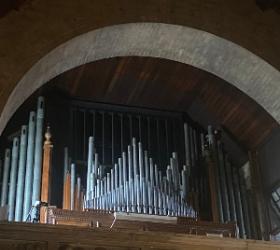
Corliss R. Arnold of Venice, Florida, died September 19, 2003, at the age of 77. He held the doctorate in sacred music from Union Theological Seminary in New York City and was Emeritus Professor of Music at Michigan State University where he taught for thirty-two years. He served as organist and director of music at the Peoples Church, East Lansing, for thirty-three years. Dr. Arnold was a Fulbright Scholar to France, studied at the Summer Organ Academy at Haarlem in the Netherlands, and held three certificates from the American Guild of Organists: the Associateship, Fellowship and Choirmaster. He was the author of the first major survey of organ literature in English: Organ Literature: A Comprehensive Survey, Scarecrow Press, Metuchen, New Jersey. The book is currently in its third edition. Dr. Arnold and his co-editor had almost completed the 4th edition, which will be completed and published this year.
Arnold received the B.Mus., Summa cum laude, from Hendrix College in Conway, Arkansas, and the M.Mus. from the University of Michigan, Ann Arbor Michigan. He had also been a church musician at First Presbyterian Church and First Methodist Church, both in Conway, Arkansas; First Methodist Church, El Dorado, Arkansas; Reformed Church of Closter, New Jersey; First Methodist Church and Templar B'nai Abraham Zion, both of Oak Park, Illinois. Corliss Arnold is survived by his wife of 42 years, Betty Arnold, their three children and five grandchildren.
Natalie Ferguson, copy editor for The Diapason, died on December 10, 2003, after a long battle with cancer. She was 69. Her work at Scranton Gillette Communications began as a typesetter and grew to include copy editing for many of the company's publications, production editor and copy editor for The Diapason, and editor of AV Guide. Born in Indianapolis, Indiana on October 31, 1934, she attended Shortridge High School, where she wrote for and edited the school newspaper and was a member of the Fiction Club. She studied piano and organ growing up and played for many groups in which she was active including church, Girl Scouts, D.A.R. and Job's Daughters. She attended Milwaukee-Downer College (now part of Lawrence University) and graduated with a degree in Occupational Therapy. She worked as an OT until her two daughters were born. She moved to the Chicago area in 1962 and was active at church and in local community theater groups. Prior to coming to Scranton-Gillette in 1985, Ms. Ferguson worked for many years at Bartlett Manufacturing in Elk Grove, Illinois. One of her joys was teaching piano, and at one point taught at the John Schaum School in Milwaukee, and taught for the past 20 years at Schaumburg Music. She was a member of Our Saviour's United Methodist Church, Schaumburg, Illinois, where her activities included the Evangelism Committee, singing in the choir, directing the chime choir, accompanying the children's choir and, proofreading bulletins and newletters. She is survived by daughters Linda Deneher and Susan Ferdon, grandchildren Jenna, Kate, and Jimmy Ferdon, and long-time devoted friend, Allen Johnson.
Dirk Andries Flentrop died on November 30, 2003 in Santpoort near Haarlem, the Netherlands. Born in Zaandam, the Netherlands on May 1, 1910, Flentrop was undoubtedly one of the most influential organ builders of the twentieth century worldwide. After an apprenticeship with the Danish organ building firm Frobenius, he entered the business of his father, H.W. Flentrop, and took over the firm in 1940. He was an early advocate of mechanical action and of the Rückpositiv, and after World War II built a whole series of new organs in a concept which was later to be labeled "neo-baroque," a term he himself disliked immensely. The contact with E. Power Biggs and with many Fulbright scholars in Europe led to an enormous production in America; in the 1960s, almost half of the firm's annual turnover came from America.
The best-known examples of Flentrop's art in America are perhaps the organs in Busch Hall at Harvard University (1959), St. Mark's Cathedral, Seattle (1965), and Duke University (1976). Flentrop's restoration activities include the famous Schnitger organs in Alkmaar and Zwolle--even though the Zwolle restoration has often been criticized--as well as organs in Portugal and Mexico City. Flentrop retired in 1976, selling the business to his employees. Almost thirty years later, Flentrop Orgelbouw--celebrating its 100th anniversary this year--is still a sought-after firm for both restorations (the Alkmaar Schnitger was again restored by Flentrop Orgelbouw in 1987) and new organs. The organ for Holy Name Cathedral, Chicago (1989) was the firm's last major project in America. Flentrop held honorary doctorates from Oberlin College and Duke University.
--Jan-Piet Knijff




